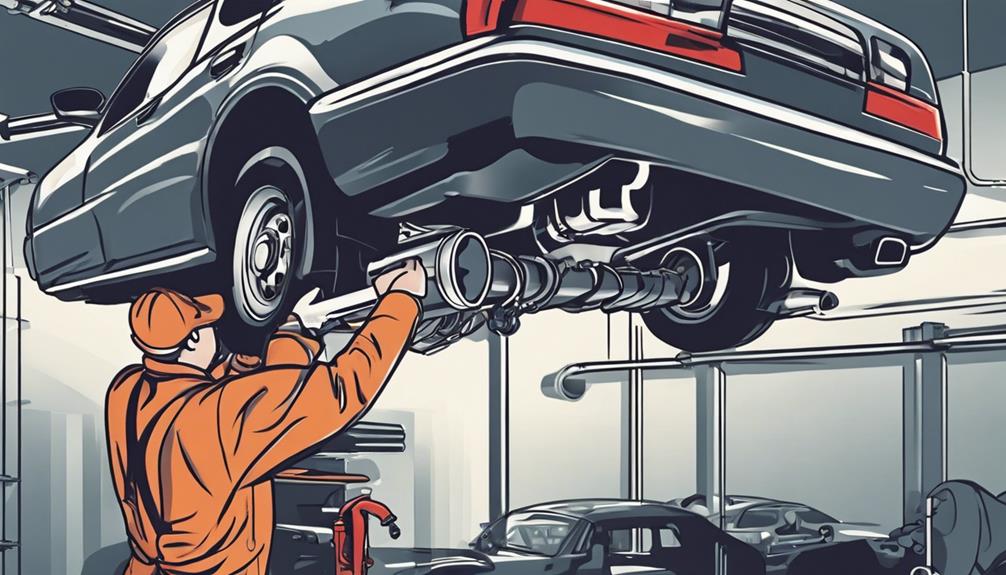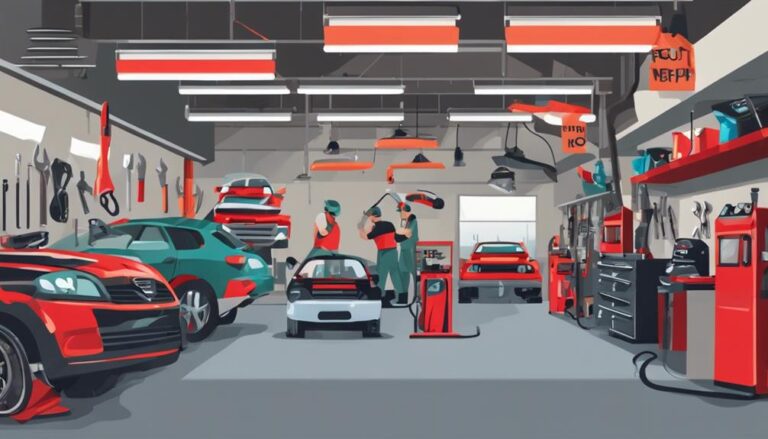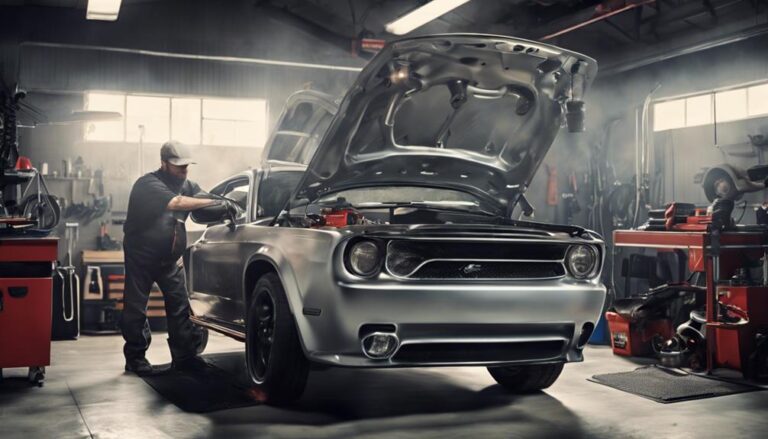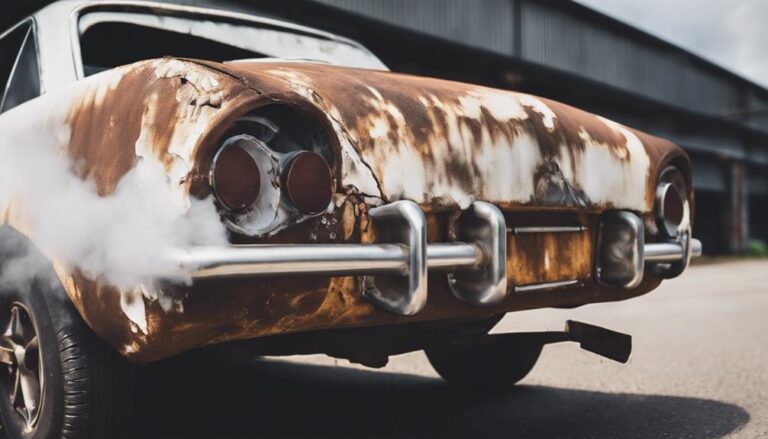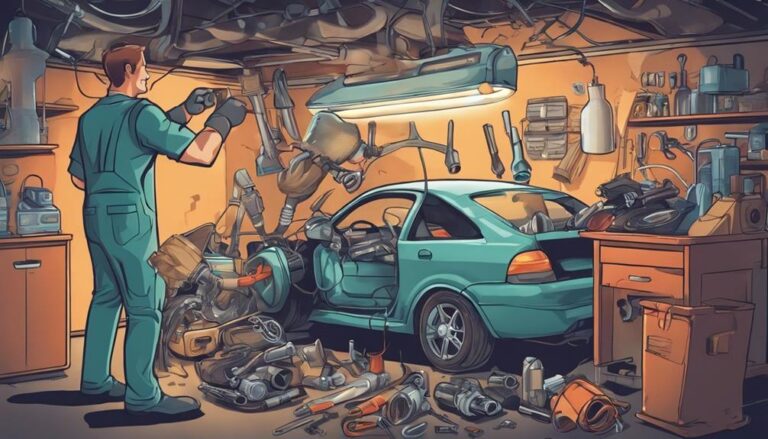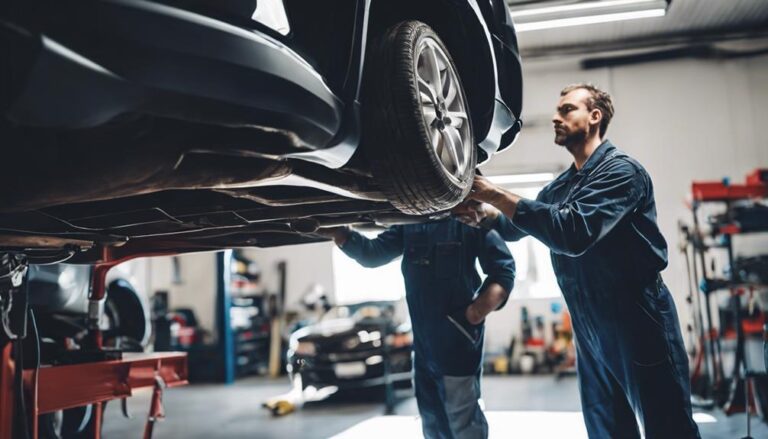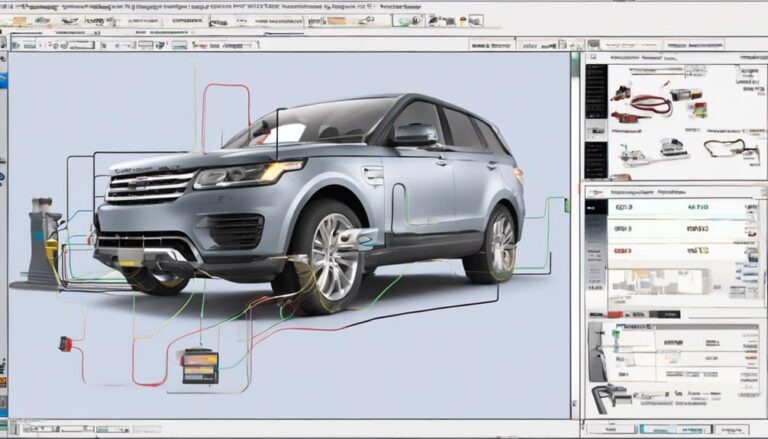10 Best Tips for Timely Exhaust System Maintenance
You may think your exhaust system is just there to give your vehicle a little personality, but it has a bigger role to play.
What if I told you that neglecting its maintenance could lead to unexpected headaches and expenses? Well, there's a reason why timely maintenance is crucial.
Stay tuned to discover the top 10 tips that will keep your exhaust system in top shape, ensuring a smooth ride and peace of mind.
Key Takeaways
- Regular maintenance ensures optimal performance, longevity, and environmental friendliness.
- Swiftly address issues to prevent costly repairs and maintain system integrity.
- Employ maintenance techniques like rust prevention and corrosion repair for longevity.
- Monitor catalytic converter health regularly to optimize emissions and performance.
Importance of Timely Maintenance
To maintain optimal engine performance and fuel efficiency, timely maintenance of your exhaust system is crucial. Implementing preventive measures and understanding maintenance benefits are essential in ensuring your vehicle operates at its best.
Proper maintenance not only prevents costly repairs in the future but also extends the lifespan of your exhaust system. By adhering to maintenance schedules, you contribute to a cleaner environment by reducing harmful emissions.
Timely maintenance plays a significant role in maintaining the overall efficiency of your vehicle, ensuring it runs smoothly and reliably. Additionally, by taking care of your exhaust system promptly, you can avoid potential safety hazards and unexpected breakdowns, providing you with peace of mind while driving.
Embrace the practice of regular maintenance to keep your exhaust system in top condition and enjoy the benefits it brings in terms of performance, efficiency, and sustainability.
Regular Inspection for Early Issues
Regularly inspecting your exhaust system for early issues is crucial to maintaining its integrity and efficiency. By employing exhaust system troubleshooting techniques and early detection strategies, you can catch potential problems before they escalate, saving you time and money in the long run. Visual checks for rust, leaks, damage, or worn-out components like gaskets, mounts, and hangers are essential during these inspections. Identifying issues early on through thorough examinations can prevent costly repairs or replacements down the line, ensuring that your exhaust system operates at its best performance. Timely inspections not only contribute to the longevity of your vehicle's exhaust system but also play a vital role in maintaining its overall functionality. Stay vigilant and proactive in your approach to maintenance to address any issues promptly and keep your exhaust system in top condition.
| Early Issues Detection | Importance for Maintenance | Benefits of Timely Inspections | Effective Strategies |
|---|---|---|---|
| Rust, leaks, damage | Ensures system efficiency | Prevents costly repairs | Visual inspections |
| Worn-out components | Maintains system integrity | Enhances longevity | Utilizing diagnostics |
| Gaskets, mounts, hangers | Saves time and money | Improves overall performance | Regular maintenance |
Addressing Rust and Corrosion Promptly
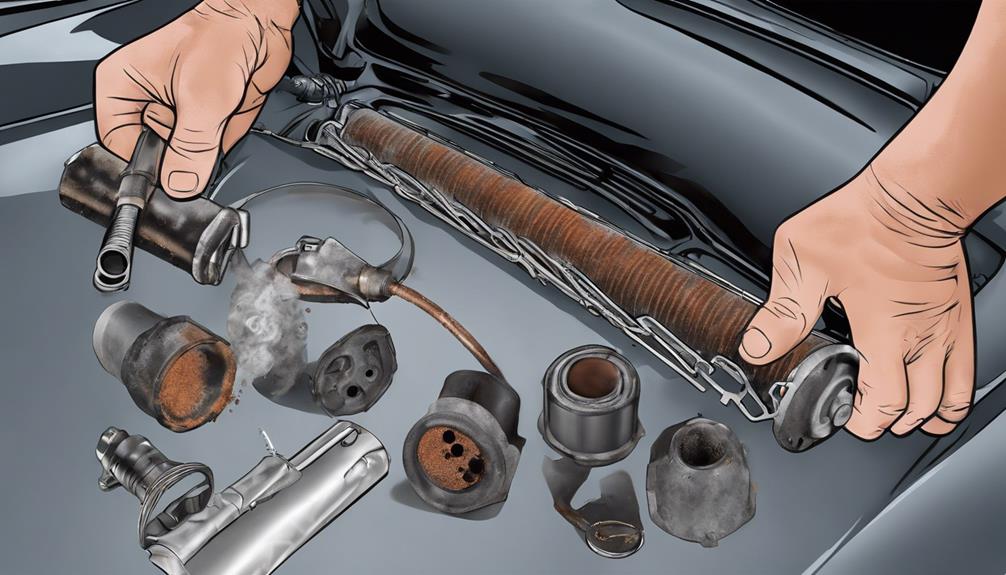
When dealing with rust and corrosion on your exhaust system, swift action is crucial.
Rust prevention techniques, corrosion repair methods, and timely inspections play a vital role in maintaining your system's performance.
Rust Prevention Techniques
How can you effectively protect your exhaust system from rust and corrosion to ensure its longevity and structural integrity? By implementing these preventive measures:
- High-Temperature Paint: Apply a high-temperature paint specifically designed for automotive exhaust systems to create a protective barrier against rust and corrosion.
- Rust Inhibitors: Regularly use rust inhibitors on vulnerable components to prevent the formation of rust and preserve the appearance of your exhaust system.
- Regular Cleaning: Clean your exhaust system components regularly to remove debris and moisture that can contribute to rust formation.
- Protective Coatings: Consider applying protective coatings to critical areas of your exhaust system to enhance its resistance to rust and corrosion.
Corrosion Repair Methods
To effectively address rust and corrosion on your exhaust system promptly, implement targeted repair methods to prevent further deterioration. When dealing with corrosion, start by removing the affected area using a wire brush or sandpaper to reach clean metal.
Next, apply a corrosion-resistant primer followed by heat-resistant paint to protect the repaired section. For more advanced corrosion, consider using patches or sealants designed for exhaust systems.
It's essential to regularly inspect your exhaust system for signs of corrosion and address any issues promptly to prevent structural damage. By incorporating these corrosion repair methods into your maintenance routine, you can extend the lifespan of your exhaust system and ensure optimal performance.
Timely Inspection Importance
Regular inspection of your exhaust system is crucial to promptly address rust and corrosion issues, ensuring the longevity and efficiency of your vehicle. Here are some key benefits and strategies for the importance of timely inspection:
- Early Detection: Identifying rust and corrosion early can prevent structural damage and extend the life of your exhaust system.
- Preventive Maintenance: Regular inspections allow for the application of rust inhibitors and protective paints, safeguarding components from corrosion.
- Preservation: Cleaning and maintaining the exhaust system regularly can prevent rust formation, preserving its appearance and functionality.
- Cost Savings: Timely inspection and maintenance of the catalytic converter can help avoid expensive repairs and ensure emissions compliance, contributing to overall efficiency.
Monitoring Catalytic Converter Health

Regularly inspecting your catalytic converter is crucial to ensure it functions optimally. Look out for any signs of damage or clogging that could affect emissions and engine performance.
Promptly addressing converter issues can prevent further exhaust system damage and maintain compliance with environmental standards.
Converter Inspection Frequency
Inspect your catalytic converter annually or every 30,000 miles to ensure optimal functionality and detect potential issues early on.
Tips for Catalytic Converter Inspection Frequency:
- Set up regular inspection intervals or use maintenance reminders to stay on track.
- Consider performance monitoring tools or emission testing to assess converter health accurately.
- Keep an eye out for signs of clogging, damage, or malfunction during inspections.
- Address any detected issues promptly to prevent costly repairs and maintain emissions compliance.
Signs of Converter Damage
When monitoring the health of your catalytic converter, be vigilant for key indicators of damage that could compromise its functionality and emissions efficiency. Early detection of an issue is crucial for timely maintenance. Keep an eye out for a check engine light, which may signal potential converter damage.
If you experience decreased engine performance like stalling or reduced power, it could be a sign of catalytic converter problems. Unusual rattling or metallic sounds from the exhaust system shouldn't be ignored, as they could indicate damage to the converter.
Additionally, an emissions test failure due to high levels of pollutants or a strong sulfuric smell in exhaust emissions are further signs of catalytic converter failure. Stay alert to these symptoms for effective maintenance.
Repair or Replacement Options
To ensure optimal emissions control and engine performance, it's imperative to consider repair or replacement options when monitoring the health of your catalytic converter. Here are some maintenance strategies to help you make informed decisions:
- Regular Inspections: Schedule routine checks to detect any signs of damage or clogging early on.
- Addressing Issues Promptly: Act swiftly when problems are identified to prevent costly repairs and ensure compliance with regulations.
- Consulting Professionals: Seek advice from experts to effectively monitor and maintain your catalytic converter.
- Consider Repair vs. Replacement: Evaluate the extent of damage and weigh the benefits of repair options versus replacement for long-term functionality.
Driving Practices for System Longevity

For optimal longevity of your exhaust system, practice smooth and steady acceleration to reduce strain on its components. Aggressive driving and sudden acceleration can put undue stress on the exhaust system, leading to premature wear and potential damage. By adopting mindful driving habits, you can ensure the efficiency and performance of your exhaust system for an extended period. Avoid rough terrains that could jolt and harm the system, preserving its condition for longer. Here is a table summarizing the recommended driving practices for exhaust system longevity:
| Driving Practices | Benefits |
|---|---|
| Smooth and steady acceleration | Reduces strain on system components |
| Avoid aggressive driving | Minimizes wear and tear on exhaust system |
| Steer clear of rough terrains | Preserves system condition |
| Mindful driving habits | Maintains efficiency and performance |
Following these guidelines will contribute to the smooth operation and prolonged lifespan of your exhaust system.
Regular Cleaning for Efficiency
To maintain the efficiency of your exhaust system, it's crucial to clean it regularly to prevent the build-up of dirt and debris.
By cleaning your exhaust system at recommended intervals, you can ensure optimal performance and longevity.
Regular cleaning helps prevent corrosion and rust formation, safeguarding the system's functionality.
Importance of Cleaning
Regularly cleaning your exhaust system is crucial for maintaining optimal efficiency and performance. Here are some reasons why cleaning plays a vital role in the maintenance of your exhaust system:
- Prevent Corrosion: Regular cleaning helps prevent the accumulation of corrosive materials that can deteriorate the components of your exhaust system.
- Ensure Efficiency: Routine cleaning ensures optimal efficiency, especially during winter months when road salt can cause damage.
- Preserve Appearance: Removing dirt and debris preserves the appearance and functionality of your exhaust system, extending its longevity.
- Prevent Build-Up: Routine cleaning prevents the build-up of harmful substances that can affect operation and lead to potential issues.
Maintaining a clean exhaust system is key to its efficiency and longevity, avoiding unnecessary wear and tear.
Frequency of Cleaning
How frequently should you conduct maintenance cleaning on your exhaust system to ensure optimal efficiency and performance levels are consistently met?
When it comes to cleaning your exhaust system, experts recommend regular maintenance intervals to uphold efficiency. Cleaning frequency tips suggest performing maintenance at least every three months, or more frequently if you reside in areas prone to harsh weather conditions like winter. Seasonal variations play a crucial role in determining the cleaning needs of your exhaust system. During winter months, it's essential to increase cleaning frequency to prevent corrosive buildup from road salt.
Timely Repairs and Replacements
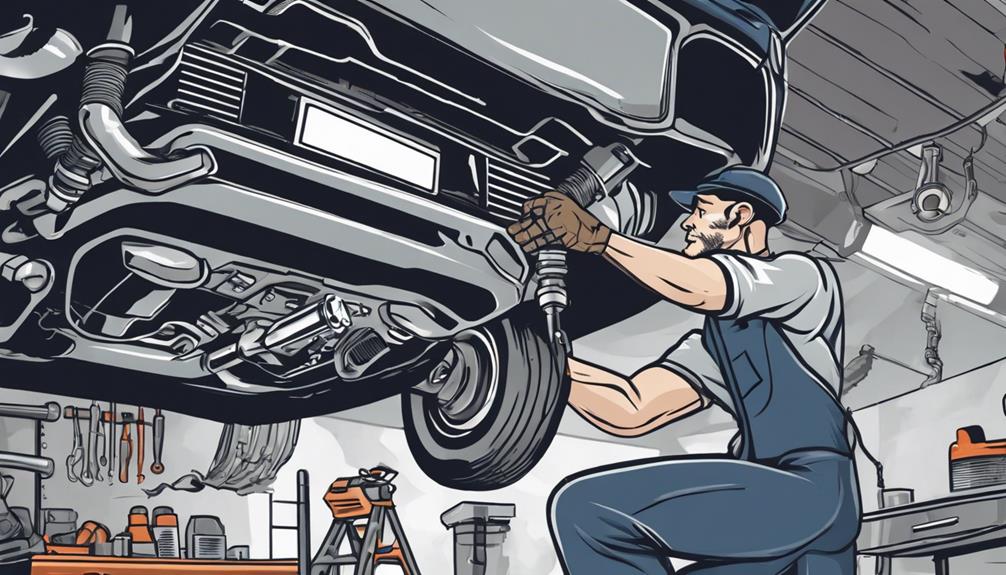
Addressing exhaust system issues promptly can significantly impact the long-term performance and reliability of your vehicle. When it comes to timely repairs and replacements, following these essential steps can help you maintain a well-functioning exhaust system:
- Prompt Attention: Don't ignore warning signs like loud noises, decreased fuel efficiency, or the smell of exhaust fumes. Addressing these issues promptly can prevent further damage and ensure your exhaust system's longevity.
- High-Quality Components: Opt for high-quality replacement parts during repairs to enhance efficiency. Upgrading components can improve the overall functionality of your exhaust system.
- Effective Restoration: Timely repairs and replacements using genuine parts are crucial for effective restoration and optimal operation. Choosing quality components ensures your system functions as intended.
- Certified Mechanics: Work with certified mechanics for exhaust system services. Their expertise guarantees reliability in the repair and replacement process, giving you peace of mind knowing your vehicle is in good hands.
Professional Exhaust System Inspections
Professional exhaust system inspections involve a comprehensive assessment to identify leaks, damage, rust, and ensure proper component functionality. Certified mechanics utilize specialized tools and equipment to accurately diagnose any issues present in the exhaust system.
Through detailed inspection reports, the condition of the exhaust system is outlined, along with recommendations for repairs or replacements. These professional inspections not only aid in maintaining compliance with environmental regulations but also enhance overall vehicle safety.
By detecting minor problems early on, regular inspections help prevent costly repairs and maintain optimal vehicle performance. Moreover, for those interested in performance tuning or exhaust upgrades, professional inspections serve as a fundamental step in ensuring that the system operates at its best.
Trusting in the expertise of certified professionals during these inspections is crucial for the longevity and efficiency of your vehicle's exhaust system.
Understanding Warning Signs
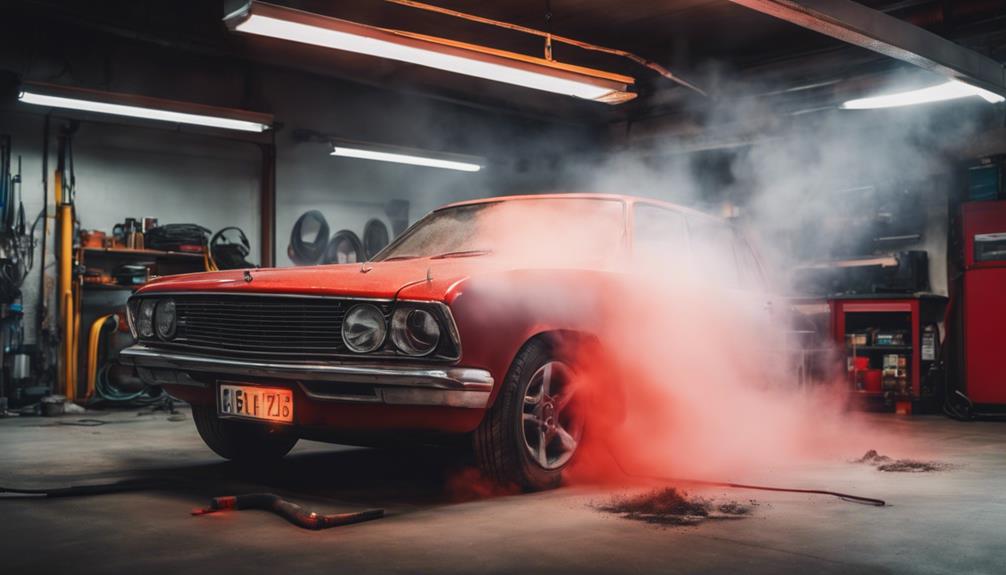
Recognizing unusual noises, decreased fuel economy, vibrations, or odd smells can signal potential exhaust system issues that require immediate attention. Here are some key warning signs to watch out for:
- Unusual Noises: If you hear loud exhaust fumes, rattling, or hissing sounds coming from your vehicle, it could indicate exhaust system problems.
- Decreased Fuel Economy: A sudden drop in fuel efficiency could be a sign of exhaust issues affecting your engine's performance.
- Vibrations: Experiencing vibrations while driving, especially when idling, might suggest problems within the exhaust system that need to be addressed.
- Odd Smells: Strange odors like burnt smells or excessive smoke production could be indicative of a faulty exhaust system.
Being vigilant and recognizing these symptoms promptly can help you take preventative measures to avoid more significant problems down the road. Addressing warning signs early on not only ensures optimal vehicle performance but also contributes to overall safety on the road.
Ensuring Compliance and Safety
To ensure compliance with environmental standards and maintain road safety, regular emissions testing is crucial for vehicles equipped with catalytic converters in most countries. Legal requirements mandate the use of catalytic converters to minimize harmful emissions and protect the environment. Following manufacturer maintenance guidelines for your exhaust system helps ensure compliance with safety regulations and optimal vehicle performance. Proper maintenance not only ensures regulatory compliance but also reduces the risk of harmful emissions affecting air quality. Monitoring and addressing exhaust system issues promptly can help prevent safety hazards and ensure a smooth driving experience.
| Safety Regulations | Environmental Compliance |
|---|---|
| Regular emissions testing | Legal requirement for catalytic converters |
| Following manufacturer maintenance guidelines | Minimizing harmful emissions |
| Monitoring and addressing issues promptly | Protecting the environment |
| Ensuring compliance with safety regulations | Optimal vehicle performance |
| Preventing safety hazards | Maintaining road safety |
Frequently Asked Questions
How Do You Maintain an Exhaust System?
Regularly inspect your exhaust system for rust, leaks, and damage. Address minor issues promptly to prevent costly repairs. Keep it clean and debris-free. Check mounts and hangers for stability. Follow manufacturer guidelines and use quality components for preventive maintenance.
What Is the Most Common Problem of the Exhaust System?
Exhaust leaks are the most common issue in exhaust systems. Signs include decreased engine performance and increased fuel consumption. Repair options involve addressing rust, worn gaskets, or damaged pipes promptly. Regular maintenance is crucial.
What Can Cause Your Exhaust System to Deteriorate Over Time?
Exposure to harsh weather conditions, high internal temperatures, road debris, chemical reactions, and poor maintenance practices can cause your exhaust system to deteriorate over time. Prevent rust, conduct regular inspections, drive carefully, and care for the muffler.
What Is the Life Expectancy of an Exhaust System?
Your exhaust system's life expectancy typically ranges from 5 to 7 years. Maximizing longevity involves proper care like regular inspections, repairs, and rust prevention. Address issues promptly to extend its lifespan and ensure optimal performance.
Conclusion
In conclusion, by following these 10 best tips for timely exhaust system maintenance, you can ensure your vehicle runs smoothly and efficiently. Remember, staying proactive and addressing issues early can save you time and money in the long run.
So, next time you hear a strange noise or notice a drop in fuel efficiency, don't delay – take action immediately. Your vehicle will thank you for it!

